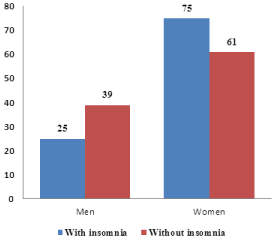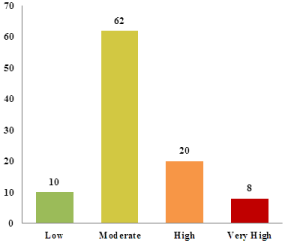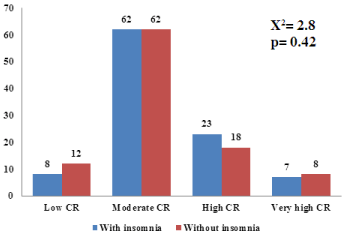Abstract
Background: In Mexico, it is estimated that 30% of the population has some sleep disorder and insomnia corresponds to 39%. There is evidence to suggest that insomnia may be related to the occurrence of cardiovascular diseases.
Objective: To know the frequency of insomnia and its association with cardiovascular risk.
Design and Setting: Analytic cross-sectional study.
Methods: The Athens survey was applied to form two groups of patients (with and without insomnia), in each group the Framingham scale was performed to calculate cardiovascular risk. The results were analyzed with the statistical program SPSS v21; in the bivariate analysis, odds ratio and Chi-square were used, with a 95% confidence interval; a p<0.05 was considered significant.
Results: 424 patients were recruited; the average age was 55.8 ± 9.4 years. The incidence of insomnia was 36%. The incidence of low cardiovascular risk was 10%, moderate risk 62%, high risk 20% and very high risk 8%. No association was found between insomnia and cardiovascular risk (p>0.05).
Conclusion: The incidence of insomnia was similar to that reported nationally in previous studies and there was no statistical significance between insomnia and cardiovascular risk.
Keywords: Insomnia; Sleep disorders; Cardiovascular risk
Introduction
Sleep is defined as the state of unconsciousness from which a person can be awakened by sensory or other stimuli [1]. Insomnia is a sleep disorder in which there is a difficulty in initiating or maintaining sleep or reaching a duration and quality capable of replenishing energy and normal waking state [2]. The International Classification of Diseases 10 (CIE-10) requires for its diagnosis that in addition to the difficulty in starting or maintaining sleep, not having a restful sleep, it lasts at least one month and that in addition, it is accompanied by daytime fatigue, sensation of significant personal unrest and social, labor or other important areas of personal activity [3].
Lack of sleep affects the functions of the central nervous system, prolonged wakefulness is associated with a progressive dysfunction of mental processes and sometimes leads to abnormal behaviors. Sleep restores levels of brain activity and the normal balance between the various functions of the central nervous system. Excessive use of some brain areas during wakefulness are able to easily break the natural balance between neuronal centers [2-3]. It is believed that the adverse cardiovascular effects of sleep disorders are mediated by their effects on the sympathetic nervous system and the activation of the renin-angiotensin system, the deregulation of the hypothalamic-adrenal axis and the chronic increase in systemic inflammation. In addition, the independent or interactive association between insomnia and depression, as well as anxiety and the risk of cardiovascular disease remains uncertain [4].
Worldwide, the prevalence of these disorders varies between 10 and 60%, depending on the diagnostic criteria used and the characteristics of the population; insomnia is the most common disorder [5]. According to the World Health Organization, 40% of the population has insomnia at some time in their life [6]. In Mexico there are few epidemiological studies related to sleep pathology. It is estimated that about 30% of Mexicans suffer from a sleep disorder [7-8].
Cardiovascular risk is defined as the probability of a clinical cardiac event over a period of 10 years [9]. Most cardiovascular diseases can be prevented by acting on risk factors such as smoking, diet, obesity, sedentary lifestyle and excessive alcohol consumption [6,10]. Cardiovascular diseases are the leading cause of death worldwide, with an estimated prevalence rate of 30-35%. Research in the past 20 years has shown evidence that suggests insomnia may be associated with the presence of cardiovascular disease [8,11]. The objective of the research was to know the frequency of insomnia and its relationship with cardiovascular risk in adults in the family medical unit #27 of Tijuana, Mexico.
Methods
Study design and population
An analytical cross-sectional study was conducted in the family medicine unit #27 of the Instituto Mexicano del Seguro Social (IMSS) in Tijuana, Baja California, Mexico; in a period between December 2018 and August 2019. Patients from 40 to 80 years of age who attended medical evaluation for any reason, who agreed to participate in the study by informed consent and who had at least one measurement of total cholesterol in the last 6 months were included. Patients who did not know how to read and write, those with a history of ischemic heart disease and those who were being treated with benzodiazepines or sleep inducers were excluded. Incomplete surveys were eliminated.

Figure 1: Incidence of insomnia according to sex.
Variables
The collection of variables was done with a standardized data sheet; the variables collected were the following: age, which was collected directly from the patients and measured in years; sex, through phenotypic characteristics; systolic blood pressure (SBP), which was measured in millimeters of mercury (mmHg); work and type of working day, information obtained directly from the patient, the hours of workday between six and twenty hours was considered daytime and night time between twenty and six hours and mixed has time periods by day and night, provided that the night period is less than three and a half hours; smoking, defined as that person who has consumed at least 1 cigarette in the last 6 months; total cholesterol, reported in the clinical record (less than 6 months); type 2 Diabetes Mellitus (T2D) reported in the clinical record.
The diagnosis of insomnia was made through the application of the Athens survey which is positive with a score greater than or equal to 6 points, this test has a sensitivity of 93% and specificity of 85% for diagnosis with an alpha of Crombach of 0.89, has been validated in Spanish since 2008 for the Mexican population (α=0.90) [12]. The cardiovascular risk was calculated with the Framingham table, the intersection of measured variables was classified in a color representing the percentage of risk; low risk to patients with less than 1%, 1-5% moderate risk, high risk of 5-10% and very high risk more than 10% [13].
Statistical analysis
The statistical program SPSS version 21 in Spanish was used to analyze the data. Descriptive statistics were performed with frequencies and percentages to evaluate the qualitative variables, for the quantitative variables mean and standard deviation were used. The results of the groups were analyzed with odds ratio to establish association between the variables and the statistical significance was determined with Chi square. A value of p<0.05 was considered significant.

Figure 2: Incidence of cardiovascular risk.

Figure 3: Association between insomnia and cardiovascular risk.
Ethics
The study was approved by the local health ethics and research committee; with registration number R-2018-204-049. The research was conducted under the general health law on health research, the Helsinki declaration [14] and the Ottawa letter, as well as the bioethical principles [15]. Patients signed the informed consent.
Results
434 surveys were applied of which 10 were eliminated due to incomplete information, obtaining a total of 424 patients. 34% of the patients were men and 66% women. The age distribution was 40 to 80 years old with a mean of 55.8 ± 9.4 years. The incidence of insomnia was 38%, 25% men and 75% women. The incidence of low cardiovascular risk (<1%) was 10%, moderate risk (1-4%) 62%, high risk (5-9%) 20% and very high risk (>10%) 8%; the proportion of smokers was 11%; 333 suffered Diabetes Mellitus (79%); 52% were active at work, of these 37% work during the day, 5% at night and 10% in mixed day; The distribution of the SBP showed that 35% had less than 120mmHg, 54% ≥120mmHg, 9% ≥140mmHg, 1% ≥160mmHg and 1% ≥180mmHg. In the association of insomnia and cardiovascular risk with the Ji square test, there was no statistical significance (p=0.425).
Discussion
In this study, an incidence of insomnia of 38% of the population studied was observed, similar to that found in previous studies. It is estimated that in Mexico at least 30% of the population will suffer insomnia at some time in their life. In a study conducted by Collado in Mexico City in patients suffering from sleep disorders, it was observed that insomnia was the second most frequent pathology in 39.2% [8]. In addition, it was found that insomnia is more prevalent in females with 75%, a finding similar to that found in a study conducted by Ohayon in Spain in 2010 where it was found that the prevalence of insomnia was higher in women (23.9%) than in men (17.6%) [16].
Regarding the association of insomnia with cardiovascular risk, no statistical significance was found, which is different from what was found in studies carried out in other countries such as China in 2016 by Qiao He, in a meta-analysis of 15 studies concluded that insomnia was associated with a higher risk of cardiovascular and cerebral events and this risk was higher in women [17]. The variables work and type of workday were also included, assuming that they could modify the prevalence of insomnia and increase the cardiovascular risk, however no statistical significance was found among them (work, p=0.103; type of workday p=0.212). There may be an information bias in our study because mostly patients suffer from a chronic disease such as Diabetes Mellitus and Systemic Arterial Hypertension, important risk factors that increase cardiovascular risk, unfortunately there is no culture of prevention in our population. Another limitation to consider in the study is the high percentage of women compared to men.
Conclusion
Our objective was met satisfactorily observing that the frequency of insomnia was very similar to that reported at the national studies. In our working hypothesis, it was expected that there would be an association between insomnia and cardiovascular risk, however, it was not found, so the null hypothesis is approved since there was no statistical significance between both conditions. It was observed that women are at greater risk of insomnia than men and that the age or type of working day does not determine the presence of insomnia. This study opens future research because it would be important to know the factors that condition women to suffer more insomnia than men and the reason why they go to medical evaluation more frequently.
References
- Vázquez-García JC, Lorenzi-Filho G, López-Varela MV. Síntomas y trastornos del dormir en hispanos y latinos:¿Son poblaciones diferentes? Pneumol Cir Tórax. 2012; 71: 364-371.
- Guyton CA, Hall JE. Tratado de fisiología médica. 11ed. España: Elsevier; 2009.
- Sarais F, De castro P. El insomnio. An Sist Sanit Navar. 2007; 30: 1-14.
- Chien H, Yung C, Mu C, et al. The association between insomnia and increased future cardiovascular events: Nationwide population – based study. Contemp Hypn Integr Ther. 2015; 77: 743-751.
- Peñuela-Epalza ME, Páez-Jiménez DA, Castro-Cantillo LC, et al. Prevalencia de insomnio en adultos de 18 a 60 años de edad y exposición a campos electromagnéticos en hogares de Barranquilla, Colombia. Biomedica. 2015; 35: 120-129.
- Organización Mundial de la Salud. Enfermedades Cardiovasculares. OMS. c2015.
- Instituto de San Carlos III, Unidad de evaluación de tecnología sanitaria. Guía de Práctica Clínica para el Manejo de Pacientes con Insomnio en Atención Primaria. Madrid. Ministerio de Ciencia e innovación. 2009.
- Collado-Ortiz MA, Sánchez- Escandón O, Almanza-Islas, et al. Epidemiología de los trastornos del sueño en población mexicana: seis años de experiencia en un centro de tercer nivel. An Med (Mex). 2016; 61: 87-92.
- Secretaria de Salud. Detección y estratificación de factores de riesgo cardiovasculares. México. CENETEC. 2010.
- Alvares CA, Tablas de riesgo cardiovascular, una revisión crítica. MEDIFAM. 2001; 11: 122-139.
- Sánchez-Arias AG, Bobadilla-Serrano ME, Dimas-Altamirano B, et al. Enfermedad cardiovascular primera causa de muerte e hospital de tercer nivel. Rev Mex Cardiol. 2016; 27: s98-s102.
- Soldatos CR, Dikeos DG, Paparrigopoulos TJ. The diagnostic validity of the Athens Insomnia Scale. J Psychosom Res. 2003; 55: 263-267.
- Secretaria de Salud. Diagnóstico y tratamiento de Dislipidemia (hipercolesterolemia) en el adulto. México. CENETEC. 2016.
- World Medical Association. Declaración de Helsinki de la AMM - Principios éticos para las investigaciones médicas en seres humanos. Finlandia: AMM. 2014.
- World Medical Association. Otros asuntos de derechos humanos relacionados con la salud. Finlandia: AMM. 2014.
- Ohayon M, Sagales T. Prevalence of insomnia and sleep characteristics in the general population of Spain. Sleep Med. 2010; 11: 1010-1018.
- He Q, Zhang P, Li G, et al. The association between insomnia symptoms and risk of cardio-cerebral vascular event: A meta-analysis of prospective cohort studies. Eur J Prev Cardiol. 2016; 1-12.
